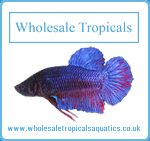Article categories:
Select a category below to view articles on each subject.
Search
Enter your keyword/s below to search :

Fish delivered straight to your door from Wildwoods
Hundreds of Species available today…
TFF Mailing List
Join the TFF mailing list today and we will email you with latest offers, news items and more.
-
Species: Balantiocheilos melanopterus
-
Species: Canthigaster solandri
-
Species: Corals
-
Species: Corydoras trilineatus
-
Species: Dry Goods
-
Species: Gobiodon rivulatus
-
Species: Godiva Executive Aquarium
-
Species: Limulus polyphemus
-
Species: Lysmata deblius
-
Species: Pantodon buchholzi
-
Species: Shop Floor
-
Species: Testudo horsefieldi
A visit to Midland Aquatics and Reptiles
Midland Aquatics & Reptiles is an independent retailer very different to the sort of stores usually associated with that phrase. Although it does have a family feel it’s quite a large store with a bright, modern feel not always typical of high street stores. All the staff are well trained, and the shop floor staff each have their own tanks to look after and carry out water tests as part of their job. It’s clear that even the youngest staff members are dedicated aquarists who work hard to keep the tanks spotlessly clean. All the livestock looked healthy on our visit. The livestock covers community freshwater fish, a few oddballs and some nice-looking goldfish and US-bred koi. There is also a small reptile and insect section, as well as a very friendly bearded dragon who lives near the tills.
The shop is located a short distance from the western end of Daventry Road where it meets Leamington Road, Leamington Road running between the A45 to the south and Coventry town centre to the north. There’s parking in the front and side of the store and on the adjacent streets. Coventry railway station is a little over half a mile to the north. If the station is exited via the Warwick Road bus stop exit rather than the main exit, it’s a fifteen-minute walk down Warwick Road veering to the east down Leamington Road at the junction by the park, and then east again into Daventry Road.
Freshwater
The selection of freshwater fish at Midland Aquatics & reptiles wass primarily geared towards community tanks but an additional 27 tanks have now been added to increase the Cichlid population. With a few exceptions, most of what was on sale could be fully expected to get along with each other in the same tank. We did see serpae tetras (Hyphessobrycon eques) and black widow tetras (Gymnocorymbus ternetzi), both of which can be nippy, serpae tetras almost always so, but otherwise these were all well-chosen small to medium-sized ‘bread-and-butter’ tropical fish.
Corydoras catfish are always popular, and we saw several species on sale at Midland Aquatics & reptiles including the two most popular species, Corydoras aeneus and Corydoras paleatus, the latter available here in its albino form as well as the standard variety. There were also some of the less often seen varieties, including the lovely Corydoras trilineatus, the species almost always called ‘Corydoras julii’ by hobbyists and retailers alike. These little catfish have a reticulated pattern on their heads and a distinctive black line along their flanks with two white lines above and below it. They also have a black blotch on their dorsal fins. Like almost all Corydoras catfish they tolerate a broad range of water chemistry conditions but they dislike warm water at shouldn’t be kept above 25 degrees C for long periods, and ideally between 22-24 degrees C. These are very sociable animals and should be kept in schools of no fewer than four specimens. Ideally, keep them in a tank with smooth silica sand that allows them to burrow safely. Kept properly these are hardy, long-lived fish that work in most community tanks.
One of the large display tanks at Midland Aquatics & Reptiles contained an adult silver shark (Balantiocheilos melanopterus), a beautiful fish but also a good warning to potential buyers just how big these fish can be! There were also some juveniles on sale, and despite their large size, these are spectacular fish for the aquarist who can give them sufficient space. Since adults reach lengths of around 30 cm, silver sharks will need aquaria upwards of 375 litres. Silver sharks are active fish that need a tank with swimming space and a strong water current, and it is also important that the tank has a hood because they are notorious jumpers. They are omnivorous fish that require both green and meaty foods in their diet, but in a large tank they aren’t difficult to keep.
Despite their size they are nervous though, and are best kept in groups of their own kind away from boisterous tank mates like cichlids.
The African butterflyfish (Pantodon buchholzi) is an oddball species that makes a good test for any retailer. These are picky fish that often ignore cheap floating foods, and their long fins make them easy targets for nippy tank mates like barbs and tetras. We were very pleased to see that the species at Midland Aquatics & Reptiles were kept on their own and had been weaned onto New Era tropical fish flake. All the specimens in the tank went for this food without the least complaint, and it’s obvious that these African butterflyfish would make great additions to any quiet, well-planted community tank. While African butterflyfish are not difficult fish to keep once feeding, they do jump out of open-topped tanks and they will eat small tankmates up to size of a male guppy. Like most fish from West Africa they do best kept in soft to moderately hard, slightly acidic to neutral water conditions. They dislike strong water currents.
The range of gouramis on sale include dwarf gouramis, gold gouramis, blue gouramis, moonlight gouramis and snakeskin gouramis. The snakeskin gourami (Trichogaster pectoralis) is more a food fish than a pet fish, reaching up to 25 cm in length and rarely seen in aquarium shops. But it is a lovely species in its way, and its brassy body colouration and the bold black stripe along its flank will certainly catch the eye, especially in a shady, well-planted aquarium. This species is usually very well behaved despite its size, and generally ignores smaller tank mates of dissimilar types, though as with all gouramis males bicker amongst themselves and are prone to chasing smaller gouramis and bettas. The snakeskin gourami is extremely hardy and adaptable, but like other gouramis it dislikes strong water currents.
All the fish looked healthy, and as noted earlier on, the staff here don’t put anything on sale before its feeding properly. In this case we were pleasantly surprised to see even finicky things like cleaner wrasses (Labroides dimidiatus) and bicolor angels (Centropyge bicolor) feeding nicely.
Reptiles
Reptiles are becoming increasingly popular as the cost of providing the right environment continues to drop. Among other things, we were impressed by the variety of products available to easily convert budget fish tanks into reptile vivaria, such as fluorescent lamps that provide both ordinary light and the essential UV-B most reptiles need to stay healthy. Midland Aquatics & Reptiles also sells complete kits that make it possible to put together a complete habitat for something like a bearded dragon for around £200.
Among the species on sale at Midland Aquatics & Reptiles are blue-tongue skinks, leopard geckos, bearded dragons, turtles, frogs, tortoises and a variety of small snakes. Locally-bred bearded dragons featured strongly, and we were very pleased to see this. Of all the reptiles kept as pets, this is the one species that truly becomes tame. If properly maintained and handled regularly, this species can develop a very real bond with its keeper. But like all reptiles, they are quite demanding, and anyone who wants to keep one should certainly spend some time reading up on their needs and budgeting carefully.
Another good choice on sale is the tortoise Testudo horsfieldi, a species from West Asia. Compared to the more familiar Greek and spur-thighed tortoises this species is relatively small with a shell length of up to 20 cm in the case of females and a bit less for males. They are primarily herbivores with a preference for green leaves, things like dandelion leaves, clover and chickweed being ideal, with curly green lettuce, kale and mustard greens making suitable substitutes. Soft, non-acidic may be offered very occasionally but overuse of these things can cause health problems; meaty foods shouldn’t be offered at all. As with all tortoises calcium is a key nutrient, it is best made available by offering cuttlebone or by dusting food with a suitable nutritional supplement. Maintenance is easiest in a dry-climate vivarium with a heat lamp providing warmth of 30 degrees C at one end and a cooler area, preferably with a cave, at the other end. They can be kept outdoors during the summer, though all tortoises are excellent diggers and climbers, and are best confined to a hutch to keep them from escaping or falling into ponds.
The ‘Godiva’ aquarium range
One of the things that sets Midland Aquatics & Reptiles apart from other independent stores is its ambition: rather than just selling off-the-shelf aquarium kits, Midland Aquatics & Reptiles has its own line of locally manufactured Godiva-branded aquaria featuring high-quality cabinets and top-notch fishkeeping hardware. These are quite competitively priced given the build quality and specifications, and are available in ‘Standard’, ‘Executive’ and ‘Supreme’ models for both freshwater and marine fish keepers.
The ‘Executive ’ 36 x 24 x 18 freshwater unit for example has a capacity of about 250 litres and costs under £450, while the Juwel 260 tank is about £400. While the Juwel comes with a cabinet fully built (not flat-pack) to a far higher standard than the Juwel unit and with additional things like waterproof trims and no-slam door hinges. Throw in the free delivery across mainland England and Wales carried out by the company itself rather than a generic dispatcher without any knowledge of handling glass and aquarium hardware, and the Godiva series starts to look like a bit of a steal!
Overall Midland Aquatics & Reptiles is a good example of what independent retailers need to be doing to survive in an increasingly competitive market.
Well worth a visit.
Other fish articles:
Other fish articles you may be interested in are listed below, click an article for full details.
-
FISH ARTICLE
-
FISH ARTICLE
-
FISH ARTICLE
-
FISH ARTICLE






